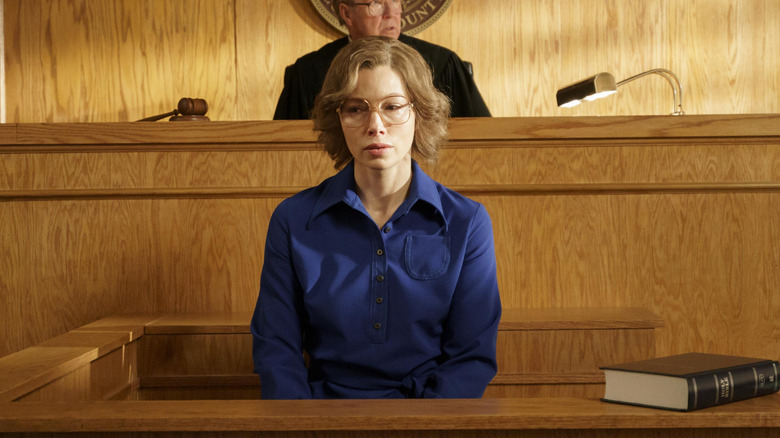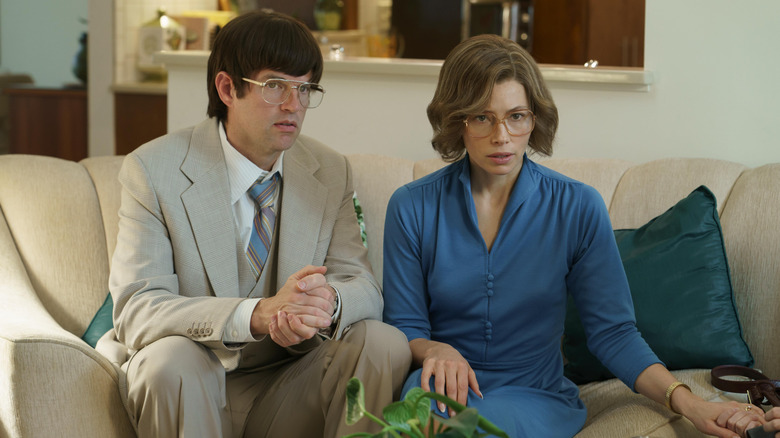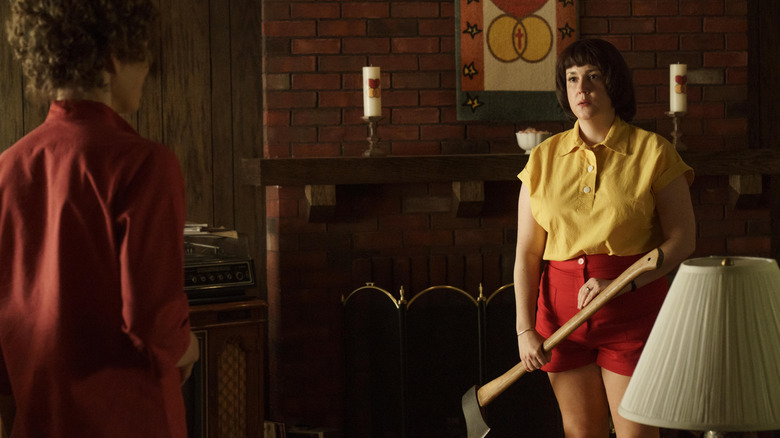The True Story Behind Hulu's Candy Montgomery Miniseries, Explained
Decades later, the 1980 true crime story of rural Texas mom-turned axe murderer Candace "Candy" Montgomery retold in the Hulu miniseries "Candy" still stands out as one of the most baffling and disturbing crimes ever to capture the news-watching public's imaginations. Disturbing because it serves as a grim reminder that the smiling face who brings pecan pies to church picnics could be hiding a thousand lies and a world of dark secrets; baffling because of the controversial jury decision that allowed one such smiling face to walk away from the courthouse scot-free.
The series stars Jessica Biel as the mousy-looking church lady who went full Jack Torrance in "The Shining" on neighbor Betty Gore (Melanie Lynskey) after an affair with Gore's husband caused her to catch feelings, and is just one of several adaptations to explore the small-town horror story. Told from Candy's perspective, "Candy" accurately draws on details taken from the case to execute its unsettling examination of the unraveling of a woman so tightly wound that she planned her affair on a clinical level.
The real Candy was a suburban Texas housewife with a steamy secret
Just like the story portrayed on Hulu and the Max series "Love & Death," the real Candy Montgomery's story is a cautionary tale about the existential miseries that can arise from marital stagnation. While in her late 20s, Candy Montgomery moved to the population of 3,700 town of Wylie, Texas, with her electrical engineer husband Pat and their two young children.
It was a pretty good life for a 1970s housewife, especially after they made friends with another couple from the local Methodist church who had kids around the same age as their own, a couple named Betty and Allan Gore. Things seemed to be going well for the families until one fateful day in 1978 when Allan and Candy physically collided during a volleyball game. After catching a whiff of Allan's musk, she began to fantasize about the dirty little what-ifs. But instead of redirecting that energy toward a paperback Harlequin like most self-respecting 1970s housewives, Candy decided to go all in on an indecent proposal for a business-only affair.
After initially turning Candy down on account of his middle school teacher wife's latest pregnancy, Allan pulled an UNO reverse and decided to take her up on the offer. The pair planned their shenanigans meticulously, even building in a clause that they would call things off if either of them started to catch feelings. Despite their careful planning and Candy's continued close friendship with Betty, some time after Allan broke things off to work on his marriage, Betty would end up slain by Candy. Her rage-fueled 41-blow attack likely only ended when Candy was too spent to continue wielding the axe.
Candy Montgomery was found not guilty despite a public outcry
To most who hear the Candy Montgomery story, her guilt seems obvious. But juries can get tripped up on pesky little details like the potential for reasonable doubt and pseudoscientific details like polygraphs and hypnosis. And together, they make as likely a reason as any for the housewife's shocking October 1980 acquittal after she claimed the act was committed in self-defense.
In the immediate wake of her crime, Montgomery had continued as if nothing had happened while leaving Betty's infant daughter alone in her crib with her mother's dead body in the next room for 13 hours. When first accused of the violent act after confessing her affair to police, Montgomery's denial of the crime would have the full backing of the congregation she and Betty had attended together for years.
In an effort to uncover Montgomery's "lost" memories from the night of Betty's murder, her attorney hired a memory retrieval hypnotist who would help make the case that repressed childhood memories of getting shushed in a waiting room led to the trauma response that made Montgomery go berserk on her secret frenemy. Aided by those claims and the testimony of a polygraph examiner presenting an improbably clear exam, Montgomery's team of lawyers, who included church acquaintance Don Crowder, successfully argued that she killed Betty in self-defense. After a mere three-hour deliberation, the panel of nine women and three men chose to acquit Montgomery, who would end up in Georgia working as a certified family counselor.
"Candy" is available to stream on Hulu.


